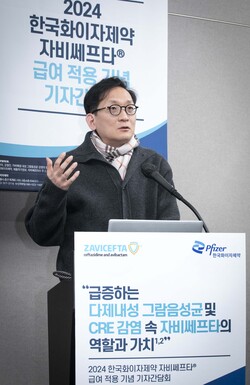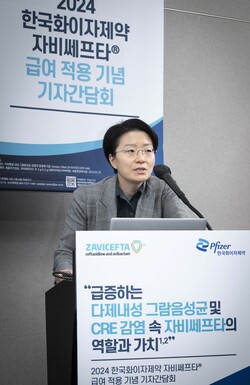Korean medical experts have welcomed the introduction of Pfizer’s Zavicefta (ingredient: ceftazidime/avibactam), a new antibiotic treatment for infections caused by multi-drug resistant organisms, including carbapenem-resistant Enterobacteriaceae (CRE).

During a press conference organized by Pfizer Korea to celebrate the reimbursement of Zavicefta, Professor Lee Dong-gun of the Department of Infectious Diseases at Seoul St.Mary's Hospital highlighted the critical role of the drug in addressing the unmet needs in the treatment of multi-drug resistant Gram-negative bacteria infections.
“The rise of bacteria resistant to three or more classes of antibiotics, including some strains resistant to carbapenems, has limited treatment options and increased the demand for effective solutions,” Lee said. "However, there has been a significant unmet need in clinical settings due to limited treatment options.”
As a result, Zavicefta is seen as the "last line of defense" in hospital infections as it is the sole active antibiotic against CRE infections, Lee added.
Another expert agreed.
“The significant increase in CRE infections in Korea, which are associated with high mortality rates, has placed Zavicefta at the forefront of medical professionals' and patients' expectations as the only active antibiotic against CRE infections in the country,” Professor Yoon Young-kyung of the Department of Infectious Diseases at Korea University Anam Hospital said.
The drug has demonstrated non-inferior treatment effects compared to standard therapies and a safety profile similar to that of ceftazidime alone in multiple phase 3 clinical trials, she added.

According to Yoon, real-world studies involving patients with CRE infections and immunocompromised individuals have shown Zavicefta's treatment success rates in complex intra-abdominal infections, complex urinary tract infections, including pyelonephritis, and hospital-acquired pneumonia, including ventilator-associated pneumonia.
“Reflecting its efficacy, the Infectious Diseases Society of America's 2022 guidelines recommended Zavicefta as a preferred treatment option for complex urinary tract infections caused by CRE or difficult-to-treat Pseudomonas aeruginosa,” Yoon said. “Similarly, the European Society of Clinical Microbiology and Infectious Diseases' 2022 guidelines recommended it for treating severe infections caused by CRE.”
Zavicefta, the only antibiotic active against CRE infections in Korea, was approved in Dec. 2022 and launched in July 2023. Starting from Feb. 1, 2024, it has been covered by insurance for the treatment of complex intra-abdominal infections, complex urinary tract infections, and hospital-acquired pneumonia in cases where carbapenem antibiotics have failed or when multi-drug resistant Pseudomonas aeruginosa or carbapenem-resistant Enterobacteriaceae have been confirmed.

